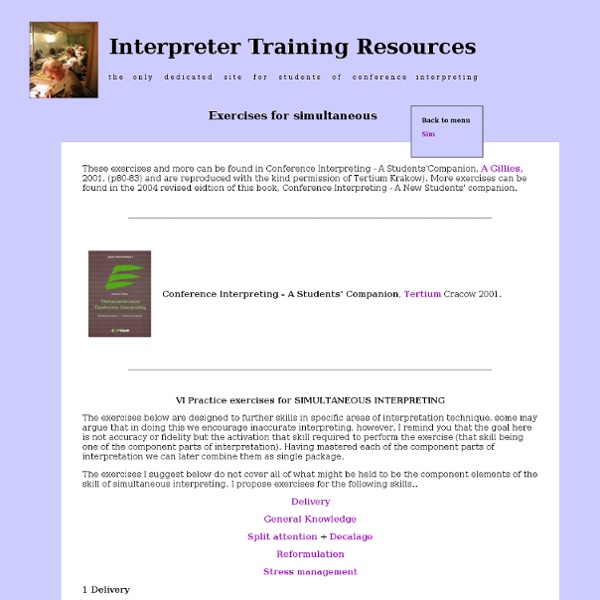The amazing brains of the real-time interpreters
One morning this summer I paid a visit to the sole United Nations agency in London. The headquarters of the International Maritime Organization (IMO) sits on the southern bank of the Thames, a short distance upstream from the Houses of Parliament. As I approached, I saw that a ship’s prow, sculpted in metal, was grafted like a nose to the ground floor of this otherwise bland building. Inside I met a dozen or so mostly female IMO translators. They were cheerful and chatty and better dressed than you might imagine for people who are often heard but rarely seen.
Interpreters and Emotional Intelligence
Details Published on Wednesday, 29 October 2014 10:20 Written by Diana Singureanu
The History of Simultaneous Interpreting on Language Outreach
History of Simultaneous Interpretation Though modern simultaneous interpretation with its use of sophisticated sound equipment is a relatively new method of providing for communication, it clearly has historical antecedents. At various times interpreters have doubled as missionaries, diplomats, military envoys, business and trade negotiators and mediators. Since French was the universal language of diplomacy and educated discourse, there was little need for high-level interpretation in the nineteenth-century Europe.
Rules for Comma Usage
Use a comma to separate the elements in a series (three or more things), including the last two. "He hit the ball, dropped the bat, and ran to first base." You may have learned that the comma before the "and" is unnecessary, which is fine if you're in control of things.
Why consecutive learning is important?
“Although I’m retired from the Commission now I still do a bit of training now and again and I sometimes get asked why students of conference interpreting on university interpretation courses spend so much of their time learning how to do consecutive interpreting when practically all the work they’ll do later as a conference interpreter- assuming they get that far- will consist of simultaneous interpreting..the difference as I’m sure most of you know being that consecutive (as the name suggests) is done after the speech, using among other things your memory and the notes you have taken during the speech to be interpreted whereas simultaneous is done in a soundproofed booth wearing head-phones while the speaker is talking..which is probably how most laymen see interpreters and also how most professional interpreters might see themselves. Should students learn CONS before SIM? Dick Fleming is a former staff conference interpreter and trainer at the European Commission, Brussels. Like this:
Glossary on Trade Financing Terms
Glossary on Trade Financing Terms of the International Trade Centre (ITC) [a] [b] [c] [d] [e] [f] [g] [h] [i] [j] [k] [l] [m] [n] [o] [p] [q] [r] [s] [t] [u] [v] [w] [x] [y] [z] Glossaire des termes financiers et commerciaux du Centre du Commerce International (CCI) [a] [b] [c] [d] [e] [f] [g] [h] [i] [j] [k] [l] [m] [n] [o] [p] [q] [r] [s] [t] [u] [v] [w] [x] [y] [z]
FeedBack from the Field ... the Interpreter Speaks ... by Anastasia Antoniou MBA
Welcome! FeedBack from the Field ... the Interpreter Speaks ... will be a collection of real stories from interpreters - an interpreter is someone who understands at least two languages and acts as a conduit between two or more people in order to facilitate communication. This clarification of the message, from language A to language B, is interpretation. An interpretation can take place in many settings and set of circumstances - anywhere where there are at least two people who want to communicate and need a third individual to skillfully utilize their command of both present languages in order to facilitate clear and accurate communication. Are you a Conference / Court / Business / Medical / Community / Retail / General / Travel Guide Interpreter?
simultaneous interpretation Archives - Translation Excellence
Simultaneous interpretation is a relatively recent invention, requiring the use of sophisticated equipment and a high level of advanced education in specific techniques and methods. Because the ability to interpret simultaneously is considered to be both demanding and difficult, it is surprising if not implausible to imagine someone with natural skill interpreting in this way… Welcome to the final article in our six-part series on simultaneous interpretation!
Resources for interpreting students
Training resources - Speech repository An e-learning tool which contains a collection of speeches organised by language, difficulty level, type of use, and subject.Access is granted to: - Universities
M e d i c I n t e r p r e t e r s
Medic Interpreters provide face-to-face interpreting by medically trained linguists to aid communication and the exchange of information between patients with limited English and health care professionals. Within today's multi-cultural society, the crucial role of a medical interpreter is invaluable to the UK health system. Our specially trained and experienced healthcare interpreters enable the accurate interpretation of medical information between patients and a medical professional faced with a language barrier. Engaged in a variety of environments and settings including Hospitals, private clinics and General Practices; our linguists interpret symptoms, medical histories, questions and concerns from patients to doctors.
University of Surrey - Guildford
Why choose this course? This is the only programme in the UK that will help you acquire advanced interpreting skills to work confidently in all modes of interpreting (consecutive, simultaneous, dialogue and telephone/video-mediated), and in a variety of contexts. We are the first university to teach remote interpreting based on research in this area. What you will study



